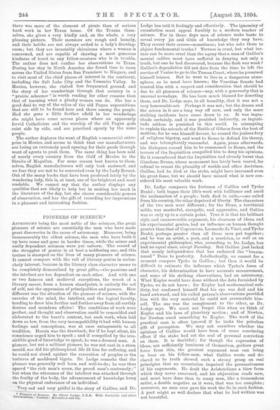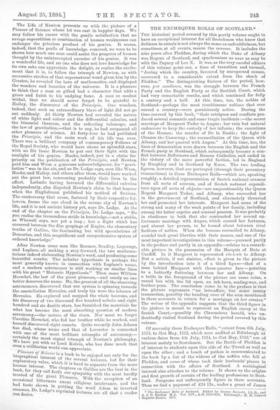PIONEERS OF SCIENCE.* ASTRONOMY being the most noble of the
sciences, the great pioneers of science are essentially the men who have made great discoveries in the cause of astronomy. Moreover, being immeasurably the oldest science, the men who have built it up have come and gone in harder times, while the minor and really dependent sciences were yet unborn. The record of the struggles of genius is at best a saddening one, and this truism is stamped on the lives of many pioneers of science. It cannot compare with the roll of literary genius in melan- choly interest, because in the literary class character seems to be completely demoralised by great gifts,—the passions and the intellect are too dependent on each other. And with one or two famous and mediaeval exceptions, the wreck of a literary career, from a human standpoint, is entirely the act of self, not the oppression of principalities and powers. How different was the situation of the pioneer of science, with the exercise of the mind, the intellect, and the logical faculty, tending to draw him further and further away from all earthly desires and mundane affairs ! The conditions of work were perfect, and thought and observation could be remoulded and elaborated to the heart's content, but such work, when laid down as law, from the very incompatibility it had with human feelings and conceptions, was at once antagonistic to all tradition. Herein was the drawback, for if he kept silent, his conscience urged him to speak ; and if compelled by the irre- sistible goad of knowledge to speak, he was a doomed man. A pioneer, but not a militant pioneer, be was not cast in a stern mould, nor did his philosophical life fit him for suffering, and he could not stand against the execration of peoples or the tortures of maddened bigots. Dr. Lodge remarks that the pioneer was generally well born and well-to-do; he was thus spared "the rich man's scorn, the proud man's contumely ; " but when the utterance of the intellect was attacked through the frailty of the body, the advancement of knowledge hung am the physical endurance of an individual.
Very sad and very pitiful is the story of Galileo, and Dr.
• incotooTo of &nonce. By Oliver Lodge, P.R.S. With Portraits and other Illustrations. London Macmillan and Oo. Lodge has told it feelingly and effectively. The ignominy of recantation must appeal forcibly to a modern teacher of science. For in these days men of science make haste to reveal every jot and tittle of knowledge they may have. They recant their errors—sometimes ; but who asks them to abjure fundamental truths ? Torture is cruel, but what tor- ture can be more cruel than the agony that a man of Galileo's mental calibre must have suffered in denying not only a. truth, but one he had discovered, because the flesh was weak P Galileo's degradation did not date from the time he left the service of Venice to go to the Tuscan Court, where he promised himself leisure. But he went to live in a dangerous atmo- sphere, as he must have known; the Venetian Senate had treated him with a respect and consideration that should be due to all pioneers of science—nay, with a generosity that is unusual nowadays. He has been much blamed for deserting them, and Dr. Lodge says, in all humility, that it was not a very honourable act. Perhaps it was not; but the drama and the actors in it are a long way off now, and only the more striking incidents have come down to us. It was ingra- titude certainly, and it was punished indirectly, as ingrati- tude seldom is punished in this world. In attempting to explain the miracle of the Battle of Gibeon from the best of motives, for he was himself devout, he roused the jealous fury of religious bigotry, and went to Rome to defend his theory, and was triumphantly successful. Again, years afterwards, his dialogues caused him to be summoned to Rome, and the terrors of the Inquisition compelled him to deny his opinions. Be it remembered that the Inquisition had already burnt that Giordano Bruno, whose monument has lately been reared, for refusal to recant the plurality of worlds and other doctrines. Galileo, had he died at the stake, might have increased even his great fame, but we should have missed what is now con- sidered his most valuable work.
Dr. Lodge compares the fortunes of Galileo and Tycho Brah6 ; both began their life's work with brilliance and amid the acclamation of a people ; both died in exile.—one exiled from his country, the other deprived of liberty. The characters of the two men were different ; for the Dane, a territorial noble, was masterful, energetic, and aggressive, and Galileo was so only up to a certain point. True it is that his brilliant style and unanswerable argument, his clearness of ideas, and his experimental genius, had an influence on human thought greater than that of Copernicus, Leonardo da Vinci, and Tycho Brah6, perhaps greater than all these men put together; and he was an artist, a poet, and a musician, as well as an experimental philosopher, who, according to Dr. Lodge, has had no equal since, except Faraday. But Galileo just lacked that manly independence that has endeared the " brazen- nosed " Dane to posterity. Intellectually, we cannot for a moment compare Tycho to Galileo ; but then it would be difficult to estimate the influence which Tycho's force of character, his determination to have accurate measurement, and some of his striking observations, had on astronomy. What Kepler would have done without the data furnished by Tycho, we do not know ; for Kepler had mathematical sub- tlety, but confessed himself that his eye was dull and his hand awkward, and his exiled patron's observations provided him with the very material be could not accumulate him- self. The one was the complement to the other, as Dr. Lodge says. We must not forget this when we think of Kepler and his laws of planetary motion ; and of Newton, for Newton owed something to Kepler. The work of the practical man is often ignored if he lacks the priceless gift of perception. We may ask ourselves whether the opinions of Galileo would have been of more convincing effect if the stake had set the seal of personal conviction on them. It is doubtful ; for though the expression of ideas, not sufficiently luminous of themselves, gathers great force from this, the greatest argument man can bring to bear on his fellow-men, what Galileo wrote and de- clared to be truth showed such a strong grasp on real principles that no recantation impaired the persuasiveness of his arguments. He dealt the Aristotelians a blow from which they never recovered, and his abjuration reads now, and must have done then to many men, like a tremendous satire, a double negative as it were, that was too complete ; moreover, no man ever gave his work the lie in such fashion. A poet might as well declare that what he bad written was not beautiful. The Life of Newton presents us with the picture of a Pioneer of Science whose lot was cast in happier days. We may follow his career with the gentle satisfaction that no savage superstition or combination of human weaknesses can endanger the priceless product of his genius. It seems, indeed, that the perils of knowledge removed, we were to be shown how much one man could assist the progress of human thought by the uninterrupted exercise of his genius. It was a wonderful life, and no one who does not love knowledge for its own sake can appreciate the delight, or realise the excite- ment that it is, to follow the triumph of Newton, as with successive strokes of that supernatural wand given him by the Creator, he revealed the laws of mathematics, and displayed the wonders and beauties of the universe. It is a pleasure to think that a man so gifted had a character that adds a grace and finish to his undying fame. A man so modest withal, that we should never forget to be grateful to Halley, the discoverer of the Principia. One wonders, indeed, that such an extraordinary blaze of light did not go out suddenly. At thirty Newton had revealed the nature of white light and colour and the differential calculus, and the binomial theorem, and the reflecting telescope, and the law of gravitation,—that is to say, he had surpassed all other pioneers of science. At forty-four he had published the Principia, and the main work of his life was over. There was a brilliant company of contemporary Fellows of the Royal Society, who would have shone as splendid stars, with no Sir Isaac Newton to put out their light with the sunlight of his genius. Hooke, indeed, put in a claim for priority on the publication of the Principia, and Newton paid him and Wren a generous acknowledgment, for " gravi- tation " was in the air, and as Dr. Lodge says, men like Wren, Hooke; and Halley, and others after them, would have worked out the great law, consuming probably their lives in the effort. Leibnitz having invented the differential calculus independently, also disputed Newton's claim to that honour when the Englishman published his method of fluxions. The controversy that arose, fostered by their respective fol- lowers, forms the one cloud in the serene sky of Newton's life, and it is not ancient history yet, says Dr. Lodge. At the end of the chapter on the Principia, Dr. Lodge says, " Do you realise the tremendous stride in knowledge,—not a stride, as Whewell says, nor yet a leap ; but a flight which has occurred between the dim gropings of Kepler, the elementary truths of Galileo, the fascinating but wild speculations of Descartes, and this magnificent and comprehensive system of ordered knowledge."
After Newton came men like Roemer, Bradley, Lagrange, and Laplace, all making a step forward, the two mathema- ticians indeed elaborating Newton's work, and producing some beautiful results. The nebular hypothesis is perhaps the most generally known in connection with Laplace's name, and a modern astronomer is still working on similar lines with his great " Meteoric Hypothesis." Then came William Herschel, the last of the great pioneers,—and surely no one better deserves the name. He, the greatest of all the observing astronomers, discovered that our system is spinning towards the constellation Hercules, and truly his were the labours of Hercules. He explored and mapped the whole heavens, and his discovery of two thousand five hundred nebulEe and eight hundred and six double stars, has furnished the materials for what has become the most absorbing question of modern astronomy,—the nature of the stars. Nor must we forget Caroline Herschel, who fed her brother while he worked, and herself discovered eight comets. Quite recently John Adams has died, whose name and that of Leverrier is connected with one of the most brilliant triumphs of astronomy,— certainly the most signal triumph of Newton's philosophy. We have yet with us Lord Kelvin, who has done much that even a utilitarian world can appreciate. Pioneers of Science is a book to be enjoyed not only for the biographical interest of the several lectures, but for their explanatory value, which it is hard to separate from the more human interest. The chapters on Galileo are the best in the book, for they call forth our sympathy with the most hardly treated of the great Pioneers. With the exception of an occasional bitterness anent religious intolerance, and the bad taste shown in putting the word Adam in inverted commas, Dr. Lodge's reprinted lectures are all that a reader can desire.

































 Previous page
Previous page